Share

Invisible Not Broken - Chronic Illness Podcast Network
Polycythemia Vera: Vampires Would Love Her {Chronic Illness Podcast}
You Are Not Your Diagnosis
What is your disorder? *
At what age did your disorder become a daily issue? *
25
Who were you before your illness became debilitating? *
I was a graduate student pursuing a career in academia but I was completely miserable on my path.
What would you do if you were not dealing with your invisible illness? *
I don't know that I'd be doing much different other than maybe having a bit more energy in general
What would you like people to know about your daily life? *
That through alternative healing methods, I'm able to live a normal life- one that I didn't think was possible back when I was diagnosed in 2004 (which was actually a misdiagnosis)
What would make living and moving in the world easier for you? *
If doctors would understand the power of their words and their attitudes in how people get better or stay sick. If alternative healing was more embraced by people, especially doctors
Do you have any life hacks? *
Tons. One of my favorites is self-care, especially something called BodyTalk Access. Others include focusing on my mindset/thoughts
What kind of support do you get from family or friends? *
I've always had pretty good support. Initially, the challenge was my diagnosis became the topic of EVERY conversation and I felt that was who I had become. But now many people don't see me that way. Close family knows some of my challenges.
Have you ever had someone not believe you have an invisible illness because of your appearance? *
I've never had someone say that to me but I don't tend to want people to know my health history
How has your invisible illness affected your relationships? *
At times it put me in the position of feeling dependent on my parents for help, support, etc. Living with a husband who was diagnosed with RA and Sjogren's last year (which isn't something he's yet told many people about) can be challenging on days when I feel tired and he's hurting.
What is your best coping mechanism? *
taking time to center myself, breathe, ground, do self-care
What are you the most concerned about and the hopeful for in the future? *
Fearful would be that things could get worse. Hopeful that the tools that have already given me so much of my health back and completely eliminate the disease
What is your favorite swear word?
I didn't use to feel this way but now it is fuck
Any questions you think we should add to this list?
What is the hardest and/or best lesson your condition has taught you?
The best lesson is that being scared of the unknown and stuffing down my feelings, fears, etc didn't help anything but made things worse. I learned my body has a lot of wisdom that I can tap into
More episodes
View all episodes
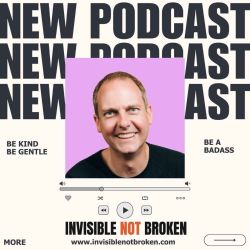
Vulnerability, Resiliency, and Advocacy with Tim Reitsma
47:06Monica Michelle is joined by consultant and podcast host Tim Reitma.Tim lives with Crohn's Disease.In this episode, Monica and Tim discuss: Tim’s resiliency through managing his Crohn’sThe importance of self-advocacy, especially in the workplace Tim’s podcast why he shares stories of those with invisible illness TIMESTAMPS00:47 - Tim's diagnosis 06:31 - How and why Tim applies self advocacy15:41 - Why Tim started his podcast22:42 - Invisible condition etiquette31:00 - What HR can do better for employees with invisible illness39:31 - Tools Tim uses to care for his Crohn’s outside the homeThe full transcript and all links mentioned can be found on the episode page on invisiblenotbroken.com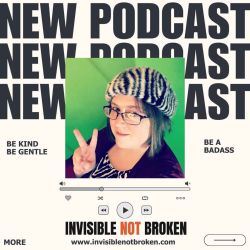
Tech and Disability: What VR Offers the Disabled Community with Sunny Ammerman
01:10:27Monica Michelle is joined by artist and disability advocate Sunny AmmermanSunny lives with Septo-optic dysplasia, panhypopituitarism, Optic Nerve Hypoplasia, and is missing a membrane in the brain called the "septum pellucidum".In this episode, Monica and Sunny discuss: Sunny’s complex disorders and how she copes with themEverything VR provides from accessible gaming, social platforms and the potential for better online education.Various VR/AR games and their gameplay Sunny’s VR support groupTIMESTAMPS00:45 - What VR/AR offers for chronically ill and disabled folks11:57 - Sunny’s conditions and how she copes with them17:55 - Features that make VR games accessible or inaccessible as well as different games and their play experiences37:13 - The social aspects of virtual gaming51:32 - What opportunities VR has for the future1:04:49 - Sunny’s VR support group The full transcript and all links mentioned can be found on the episode page on invisiblenotbroken.com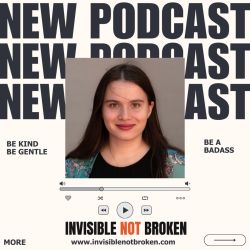
Reporting on Chronic Illness and Disability with Journalist Julia Metraux
39:16Monica Michelle is joined by Journalist Julia Metraux.Julia lives with vasculitis, mild to moderate hearing loss, and has experienced long COVID.In this episode, Monica and Julia discuss: Julia's diagnosis with vasculitis and how it influences her journalistic lensHow community impacts the mental health of those with chronic illnessHow Julia and Monica find positives and negatives in the internet spaces for chronically ill and disabled folksThe politics of how government, businesses, and celebrities influence the chronic illness community TIMESTAMPS00:32 - Julia's diagnostic journey07:02 - Julia’s work reporting on the online community of chronic illness 16:32 - The effect of Internet communities on chronically ill and disabled folks26:46 - How Julia’s illness impacts her work, both in what she writes about and how she manages her lifestyleThe full transcript and all links mentioned can be found on the episode page on invisiblenotbroken.com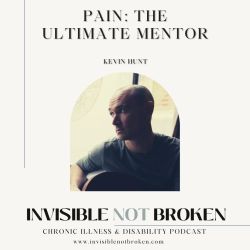
Author of “Pain: The Ultimate Mentor,” Physiotherapist Kevin Hunt
31:29Monica Michelle is joined by author & physiotherapist Kevin Hunt.Kevin lives with chronic pain.In this episode, Monica and Kevin discuss: Kevin’s philosophy of pain management as a physiotherapist who experiences chronic pain. The Hexagon Model, a life-management tool for focusing on what’s important to you.Kevin’s idea behind his new book.Using pain as a guide.TIMESTAMPS00:34 - Kevin’s work as a physiotherapist specializing in the experience of pain 06:44 - The Hexagon Model for managing your life’s needs14:00 - Putting aside the idea of a “quick fix”19:45 - Kevin’s personal experience with pain and how he uses it with patients28:44 - Kevin’s book, “Pain: The Ultimate Mentor”The full transcript and all links mentioned can be found on the episode page on invisiblenotbroken.com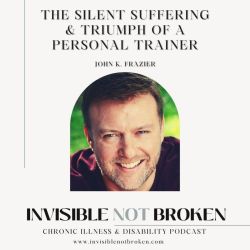
Author of “Through the Pain: The Silent Suffering & Triumph of a Personal Trainer”: John K. Frazier
28:35Monica Michelle is joined by author & personal trainer John K. Frazier.John lives with ankylosing spondylitis.In this episode, Monica and John discuss: John’s work as a physical trainer and authorChronic pain comparisonsPersonal triumphTIMESTAMPS00:50 - John’s business & diagnosis07:19 - Chronic pain olympics09:31 - Talking about & hiding a diagnosis15:09 - Personal triumph18:24 - Staying in the present23:29 - The superman complexThe full transcript and all links mentioned can be found on the episode page on invisiblenotbroken.com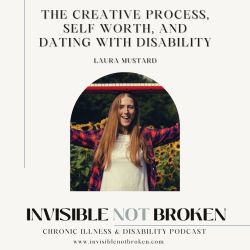
The Creative Process, Self Worth, and Dating with Disability: Laura Mustard
31:08Monica Michelle is joined by musician Laura Mustard.Laura lives with VATER syndrome.In this episode, Monica and Laura discuss: Laura’s inspiration for her upcoming musical EP.How Laura’s illness impacted her recent relationship & self-image.Laura’s creative process, new music, and social media pressure.TIMESTAMPS00:30 - Laura’s new EP / Monica’s recent COVID experience05:32 - Relationships with chronic illness11:20 - Image and self acceptance with disability15:32 - Laura’s creative process and current projects20:05 - Pursuing creativity despite social media attentionThe full transcript and all links mentioned can be found on the episode page on invisiblenotbroken.com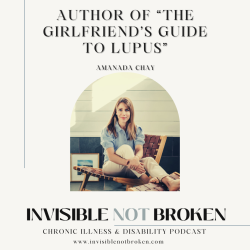
Author of “The Girlfriend’s Guide to Lupus”: Amanda Chay
30:43Monica Michelle is joined by author Amanda Chay.Amanda lives with Sjögren’s and Lupus.In this episode, Monica and Amanda discuss: Amanda’s book & diagnosisOutlooking on work & writingNavigating chronic illness with kids & familyTIMESTAMPS00:26 - Intro + The Girlfriend’s Guide to Lupus02:17 - Amanda’s diagnosis10:09 - Amanda’s outlook on writing17:11 - Navigating chronic illness with kids & family23:29 - Labels and roles26:24 - Flare reads & closing remarksThe full transcript and all links mentioned can be found on the episode page on invisiblenotbroken.com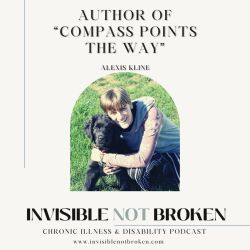
Author of “Compass Points the Way”: Alexis Kline
23:14Monica Michelle is joined by author Alexis Kline.Alexis lives with Dysautonomia.In this episode, Monica and Alexis discuss: Being a sick teenagerHaving an isolated diagnosisProductivity workflowsTIMESTAMPS00:28 - Alexis’s diagnosis & dog07:18 - Sick teenager road map10:00 - Alexis’s book & workflow16:25 - Having an isolated diagnosis20:50 - Wildlife photography, purchases The full transcript and all links mentioned can be found on the episode page on invisiblenotbroken.com
Author of “From the Sidelines to the Finish Line”: Emily Falcon
36:47Monica Michelle is joined by author Emily Falcon.Emily lives with ALCAPA.In this episode, Monica and Emily discuss: Growing up sickPost-surgery supportHaving a public bodySelf-motivation and adventuringTIMESTAMPS00:28 - Being a sick kid & Emily’s book title07:28 - Mortality10:16 - Portrayal of disability in media12:21 - Post-surgery support19:23 - Having a public body23:43 - Self-motivation29:46 - Emily’s tips for adventuresThe full transcript and all links mentioned can be found on the episode page on invisiblenotbroken.com